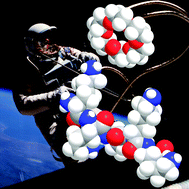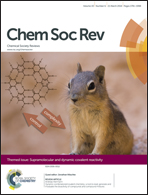Supramolecular reactivity in the gas phase: investigating the intrinsic properties of non-covalent complexes
Abstract
The high vacuum inside a mass spectrometer offers unique conditions to broaden our view on the reactivity of supramolecules. Because dynamic exchange processes between complexes are efficiently suppressed, the intrinsic and intramolecular reactivity of the complexes of interest is observed. Besides this, the significantly higher strength of non-covalent interactions in the absence of competing solvent allows processes to occur that are unable to compete in solution. The present review highlights a series of examples illustrating different aspects of supramolecular gas-phase reactivity ranging from the dissociation and formation of covalent bonds in non-covalent complexes through the reactivity in the restricted inner phase of container molecules and step-by-step mechanistic studies of organocatalytic reaction cycles to cage contraction reactions, processes induced by electron capture, and finally dynamic molecular motion within non-covalent complexes as unravelled by hydrogen–deuterium exchange processes performed in the gas phase.

- This article is part of the themed collection: Supramolecular and dynamic covalent reactivity

 Please wait while we load your content...
Please wait while we load your content...